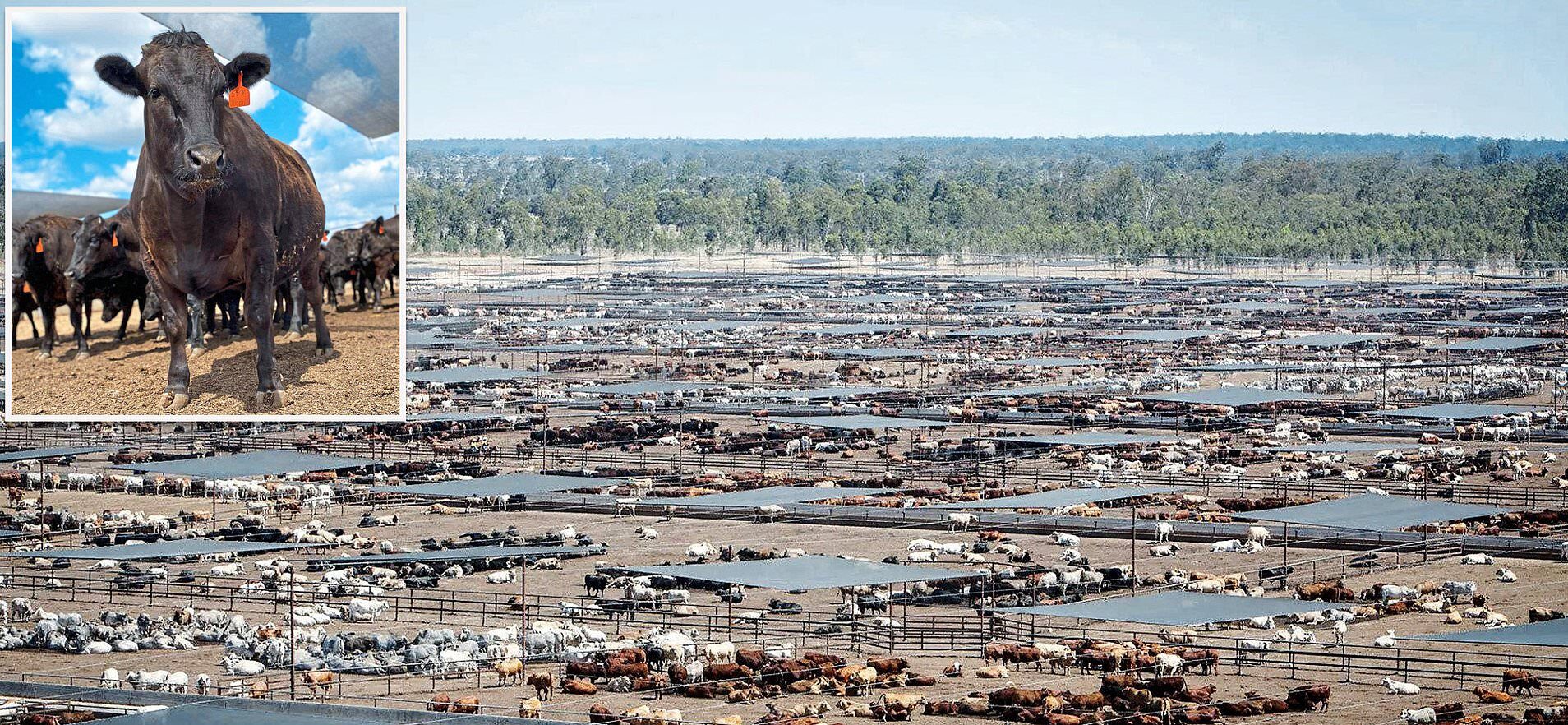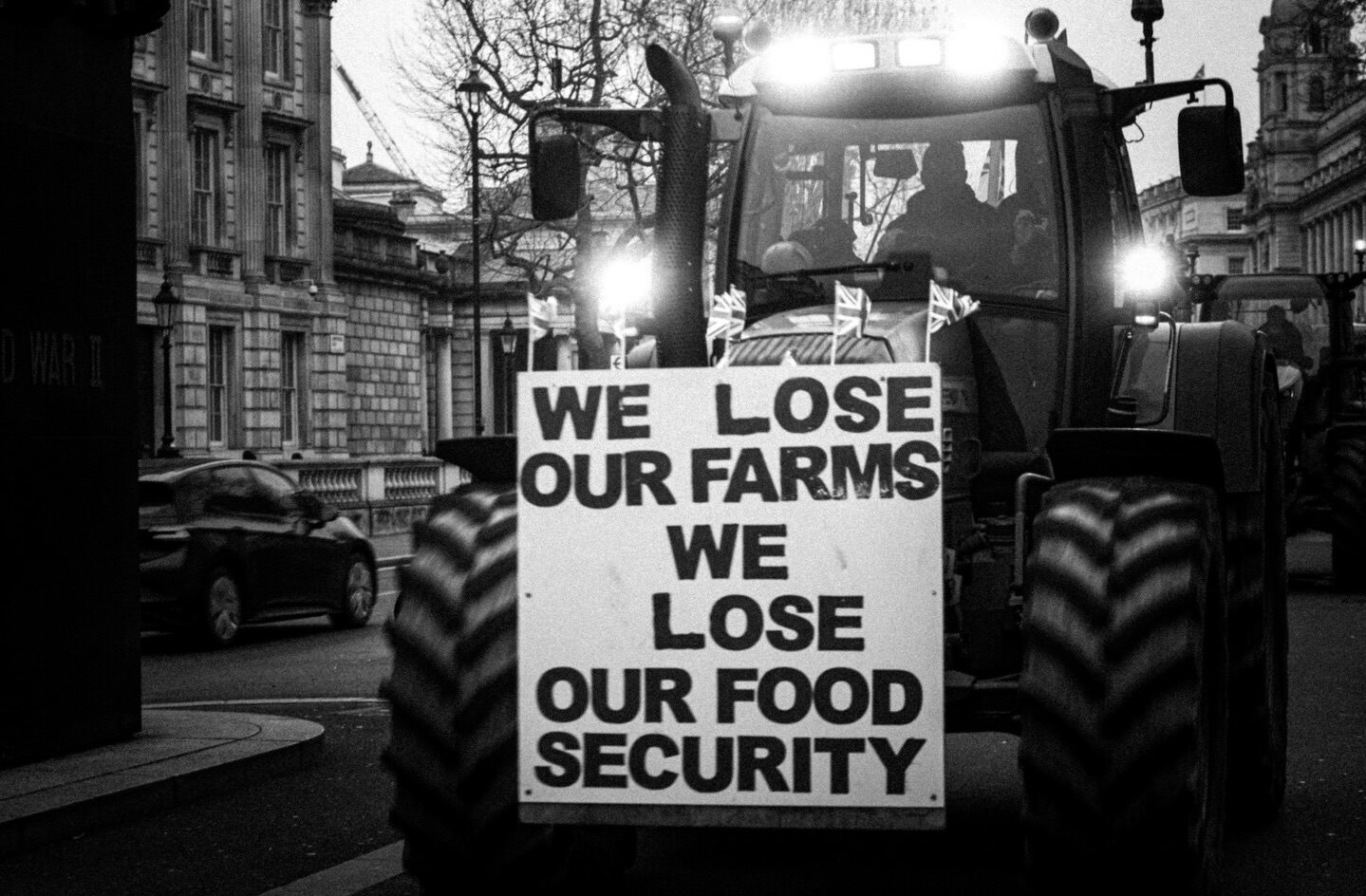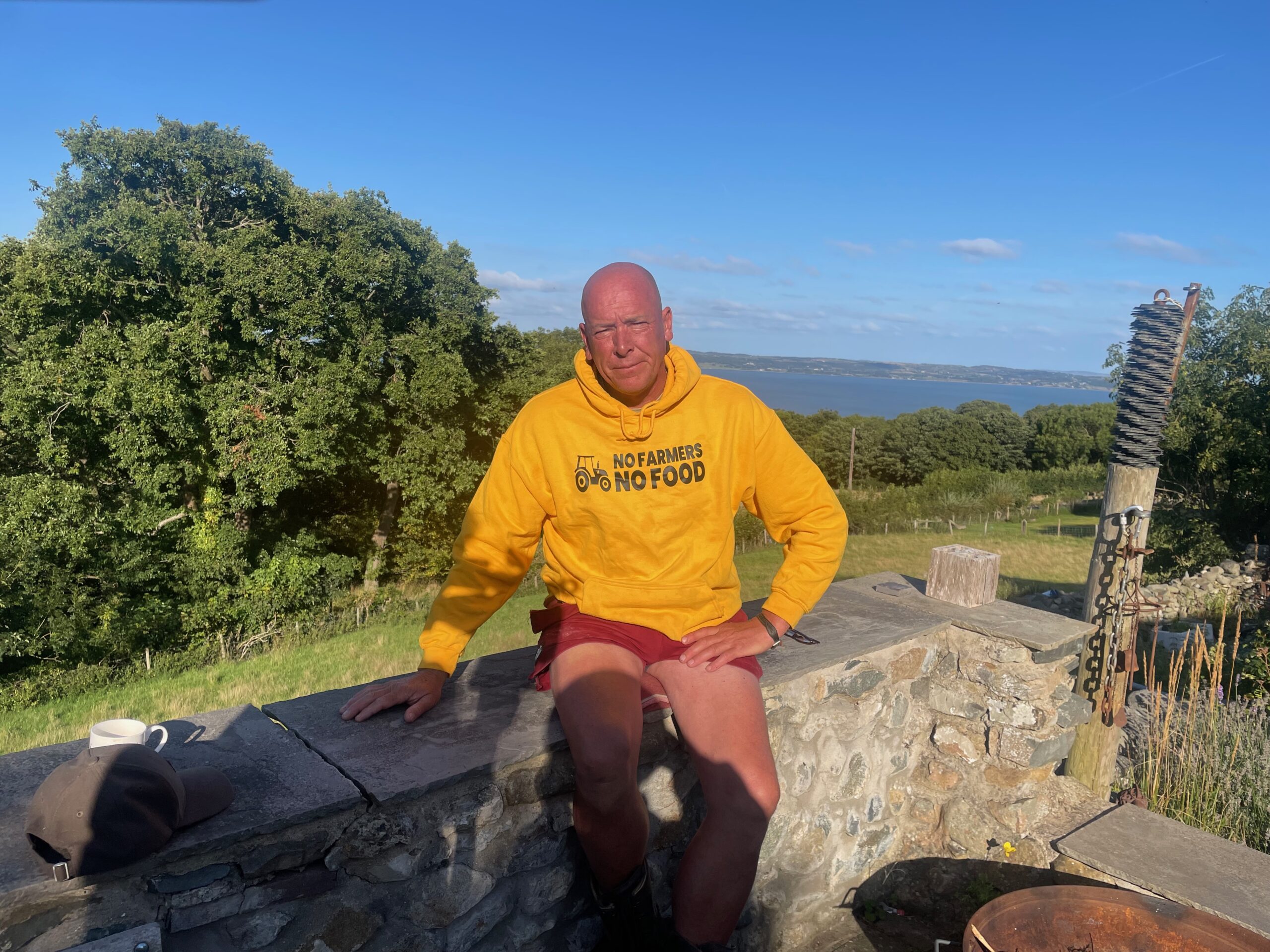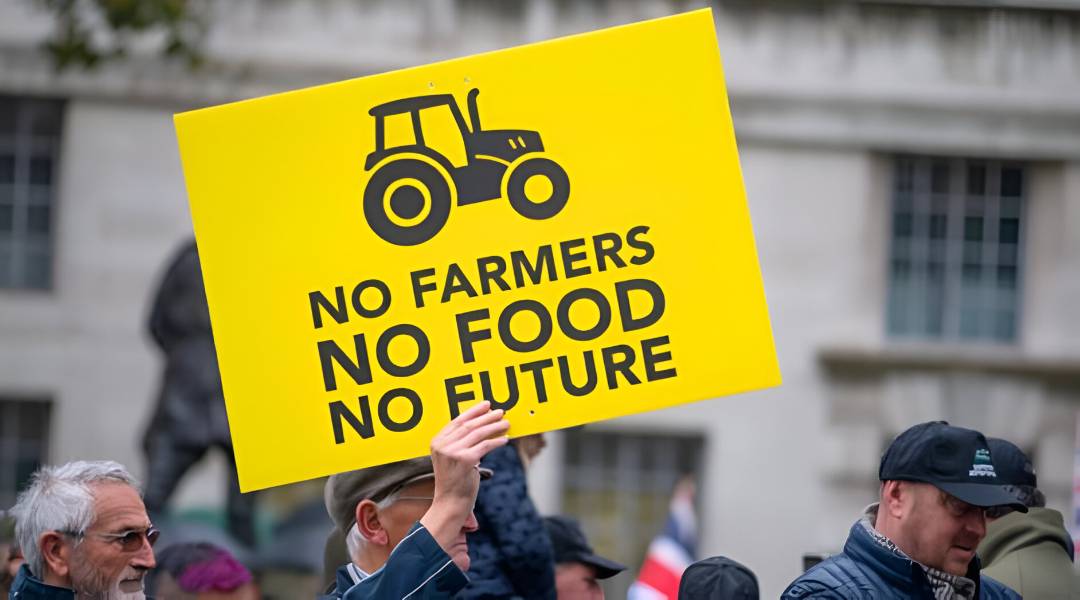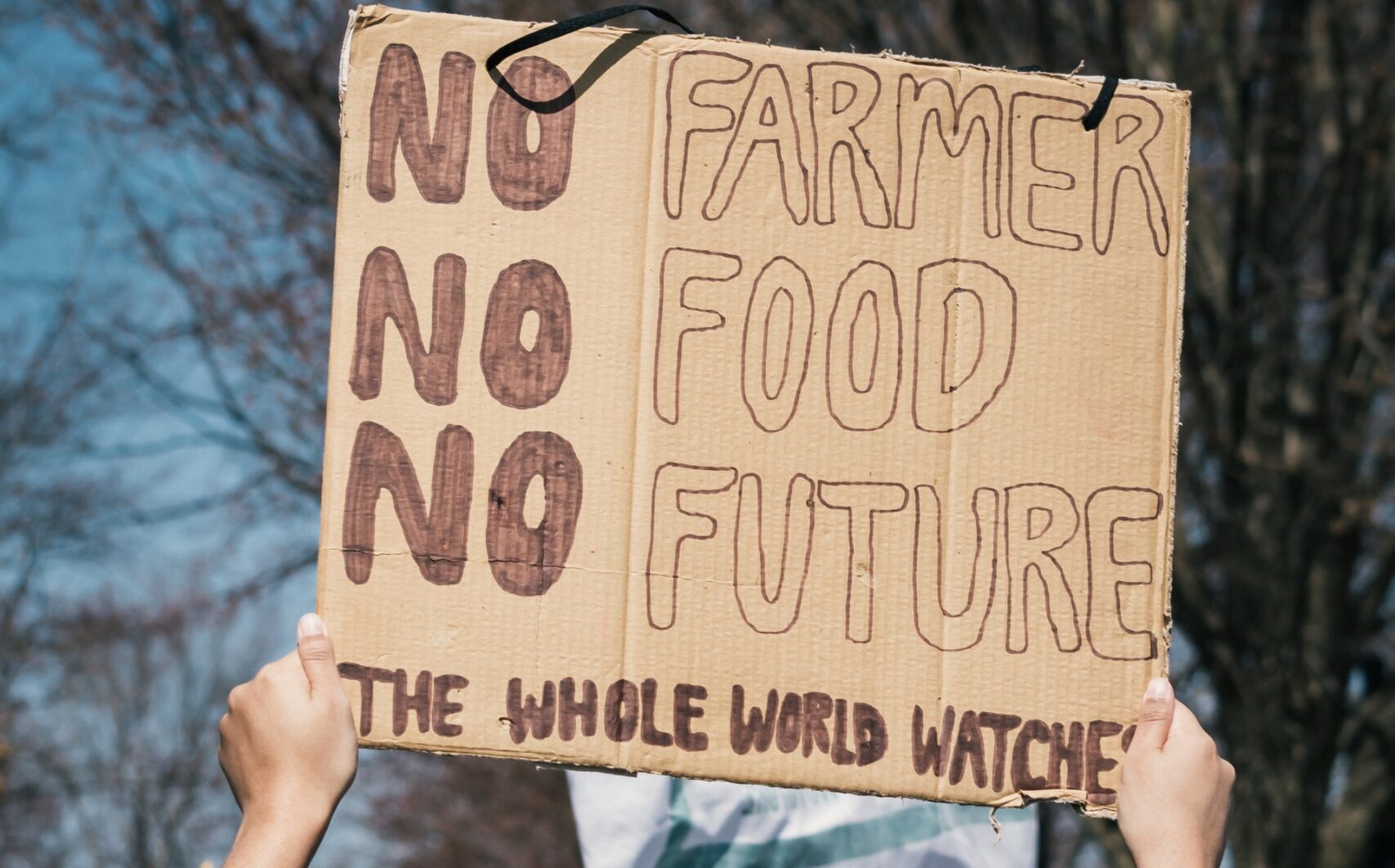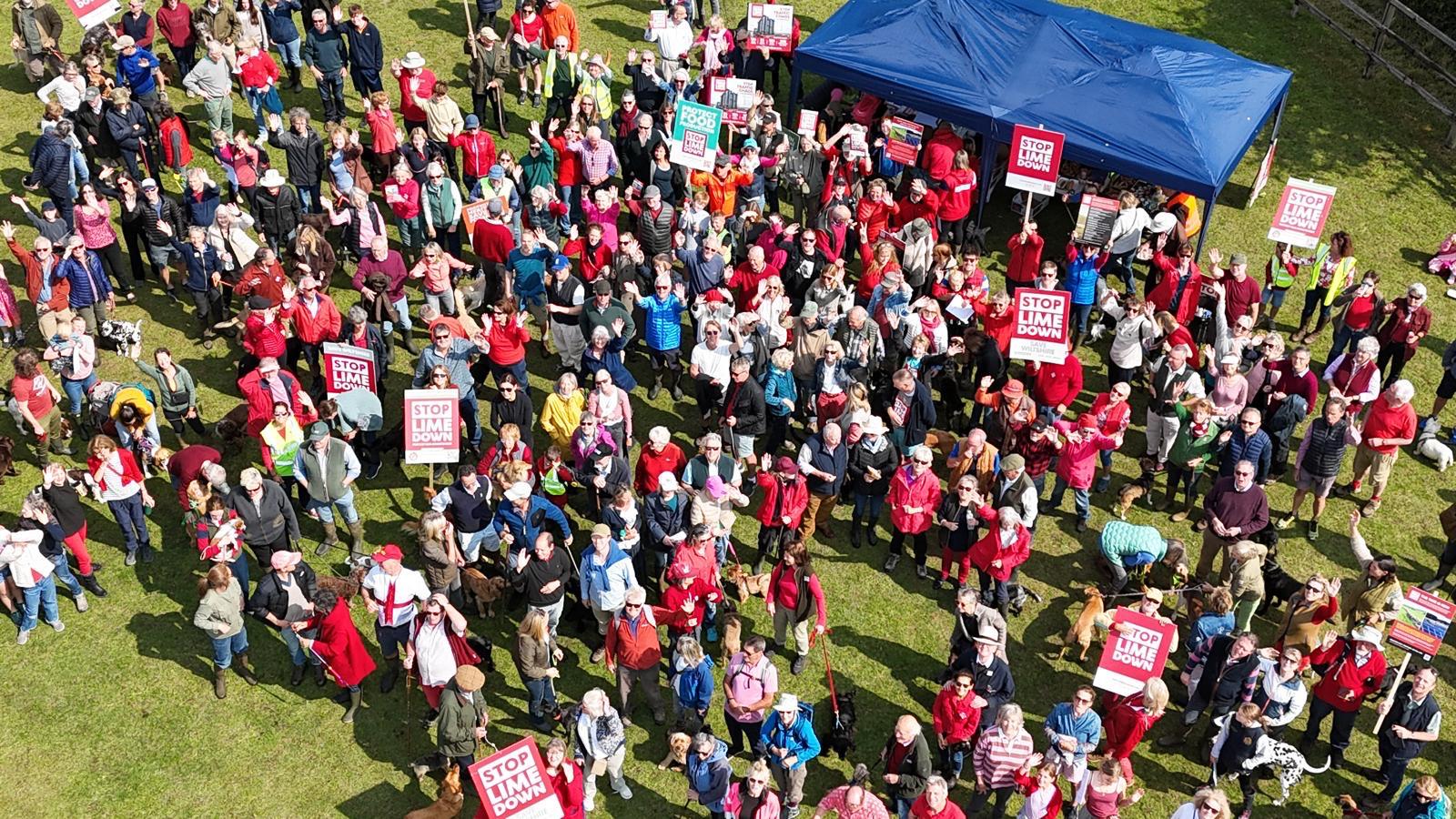Robots or humans to produce our food?
This week’s BBC Farming Today has dedicated the whole week to local food from agro-ecological farms – bliss!
This is a massive contrast to much of the ‘innovative’ farming the BBC usually features. A week in early May was dedicated to farm machinery like the two robots called Tom and Dick! The presenter was ecstatic; ‘Dick, the robotic weeder, may be at the top of every farmer’s Christmas list in years to come!‘
Robots are simply the next step in the industrialisation mindset where innovators treat symptoms of a broken food system where intensive monoculture crops grow in vast fields of compacted soil caused by massive gas-guzzling machines. Dr David Rose, Associate Professor of Agricultural Innovation at the University of Reading, describes autonomous electric vehicles with ever more sophisticated technologies that collect and monitor data, giving the tractor various things to do on its own without the need for a farmer to press any buttons or drive it. Refreshingly, he was also honest about the downsides:
- ‘Are these machines going to be affordable to buy or repair or upgrade for a farmer…?
- Where is all the data that is being collected going and who benefits? Does it benefit the individual farmer or does it more benefit the tech company who can aggregate all the data from the individual farms and use that for their own purposes?
- Are farmers locked into having to get those companies to repair their machines?
- There are issues with skills needed to use these machines or whether the raw infrastructure like mobile phone or broadband or charging points for machines are really practical to use in the middle of the field…
- There is the potential for robots to present health and safety challenges to workers or members of the public accessing farmland.’
Thankfully, this week’s Farming Today is such a massive contrast, that it will encourage people to ask why would we want robots to do our farming? We need a food system that supports meaningful work, reduces our energy consumption and agro-ecology shows that higher labour systems are more productive and allows us to farm in symbiosis with nature and support biodiversity.
Investor portfolios drive destruction
As mentioned in last week’s newsletter, we have this mad and bad farming system because banks and corporations, propelled by government stooges – blue or red – encourage the consolidation of farms in line with the corporate capture of every sector from shoes and food to mobiles and cars.
On top of this corporate capture, we see government pension funds directly benefiting from investments into damaging industrial processes. While our MPs profess their new Environment Bill in the House of Commons this week, they will be retiring on money that has been appreciating in value off the back of environmental destruction. This report by Feedback exposes the parliamentary pension funds that have poured money into destructive extractivism, such as the industrial meat and dairy industries profiting from cheap animal feed grown on destroyed former rainforest land;
“A new report analysing investments held by the Parliamentary Contributory Pension Fund (PCPF) reveals that Members of Parliament hold pension investments in a fund holding US$67m in stock from companies among the top 35 largest global meat and dairy companies. The fund—iShares Emerging Markets Index Fund, managed by multinational corporation BlackRock—includes shares of JBS, one of the biggest meat producers in the world whose business practices have been repeatedly linked to deforestation in the Amazon rainforest and Cerrado region.”
EU to support small scale farmers
This week’s dedication to small-scale family farms on both the BBC and in the press, not least The Guardian, is the antidote to all the industrial madness. The EU is going to introduce sweeping reforms of farming subsidies to try to halt the decline of small farms and protect them from the intensification of agriculture fostered by decades of previous policies.
‘Janusz Wojciechowski, the EU agriculture commissioner, said: “My intention is that this process of disappearing small farms should be stopped. The European food sector in the past was based on small farms, and it should be in the future as well.”
‘Analysis by the Guardian shows that the number of poultry and livestock farms alone in the EU, excluding Croatia, fell by 3.4m between 2005 and 2016, to 5.6m, the latest year for which comprehensive data is available. While poultry and livestock numbers increased over the period, the number of livestock farms declined sharply, showing that there has been a huge intensification of farming and that small farms have been lost. The total number of all types of farm in the EU fell during the same period from 14.5m to 10.3m’.
Despite this ‘Campaigners have warned that the CAP deal to be announced this week is likely to be “greenwash” rather than a real transformation of EU farm policy into one that is good for small farmers and the environment.’
Célia Nyssens, policy officer at the European Environmental Bureau NGO, said: “EU farm policy is a juggernaut of public spending that could be transforming agriculture towards a sustainable future and turning the tide on catastrophic nature loss. Sadly, it looks like the deal this week will continue driving the tractor in the wrong direction. A majority of funds will continue flowing to the biggest, most polluting farms, with barely any green strings attached. In this crucial decade for climate and biodiversity, the lack of ambition of the new farm policy is downright disastrous.”
Trade deals with Mexico and Canada next in line Post Australia
Thursday’s Farming Today interview with Ranil Jayawardena MP, Parliamentary Under-Secretary (Department for International Trade) revealed the government’s free-market doctrine, rhetoric and downright lies; (this transcript of the interview can be compared with The Sustainable Food Trust’s article on the impact of the Australian trade deal on our farmers).
Shockingly he claims that “Australia has some of the highest animal welfare standards in the world (their standards are atrocious, see the truth here) and so the produce that does come to Britain will be high quality, low volume, … for restaurants rather than on supermarket shelves.” (With no label offering customers the information they need to make choices, consumers won’t know that they are eating substandard food)
Part of the Trade and Agriculture Commission’s (TAC) role is to scrutinise trade deals however it currently does not exist. When asked if there would be TAC to scrutinise the Australia deal, all was revealed; the TAC cannot scrutinise a deal before it is signed, he nervously admitted that it is the government that has the power to decide, not us deplorables;
“Well (er) of course (er) the British government (er) is gonna be (er) maintaining our powers to always sign deals that we believe are in our British national interest. That’s why we’ve signed trade deals with 67 countries already (er) and we are negotiating 3 more with Australia, New Zealand and the United States.”
2 very different Brexit voters
The free trade agreements with countries with lower standards than ours, reveals the naivety of many Brexit voters. Although many farmers went bankrupt due to the EU’s flawed Common Agriculture Policy (CAP), many more will go under due to our neoliberal government’s free trade treaties with everyone anywhere. I voted Brexit to protect our food from cheaper imports as originally promised by Jeremy Corbyn (and for years by Tony Benn), who was originally a Brexiteer and extremely popular at the time of the Brexit vote so had a high chance of becoming Prime Minister. Others voted Brexit including many farmers and fishermen as they were sick of seeing 80% of the subsidies going to 20% of the farmers and being ruled by EU rules and regulations afforded by the giant corporations but devastating for small scale businesses.
The Daily Mail journalist, Isabel Oakeshott, wrote;
“I’m a free-trade Brexiteer but the idea of beef from this Australian mega farm in British shops appals me…Cheap meat imports would undercut more ethical British farmers. As a Brexiteer, I am conflicted. After all, one of the biggest attractions of leaving the EU is the ability to strike our own trade deals.”
Going on the premise that Isabel actually likes free-trade, I wonder what kind of trade deal she wants if not with Australia? Signing a free trade treaty is a promise to not protect your market from cheaper substandard imports. If you break the contract by favouring your local/national producers, you will be sued in a kangaroo court, under the insidious Inter State Dispute Mechanism (ISDM) clause, for depriving the corporation of their promised income in your market. Isabel continues;
‘Standards in the UK are by no means perfect but thankfully we have very few cattle, pig and dairy mega farms of the type common in Australia, America, China, and other parts of the world.’
‘…cattle in farms such as the Grassdale Feedlot (Australia – see photo above) are pumped with hormones and antibiotics before being rendered into cheap meat for fast food chains and supermarkets. Implants under the skin at the back of the ear continually release hormone doses to speed up the animal’s ability to convert feed into muscle and fat.’
This Australia deal would lower our environmental, animal welfare and food standards and pave the way for low standard deals with other large trading nations like the United States or Brazil. Please write to your MP via the Sustain petition to ask that they stand against this trade deal, or any deal that lowers our standards.
Cheap food or healthy food
The myth peddled that we need industrial agriculture to provide cheap food to feed those who can’t afford high welfare and pesticide free food, is thrown out by Jo Lewis, policy director at the Soil Association, who on BBC Farming Today (8.50 minutes in) says;
“We have the third cheapest food in any developed country. It hasn’t proved a solution to food poverty. We need to make sure we have the adequate social welfare policies to support those households that genuinely are very vulnerable to rises in food prices but we cannot any longer use that as an excuse to keep lowering our food standards and pushing the costs of pollution onto our planet and on to our health. So we have to treat these two agendas separately.”
Prince Charles promotes small scale farmers
In this article written by Prince Charles in the Guardian, he sings the praises of those farmers who have bucked the corporate system and continued to feed us healthy food.’
“..family farmers form the backbone of our rural communities. Their hard work puts high-quality food on our tables, which is produced to some of the highest standards in the world, and their careful stewardship knits together the environmental and social fabric of our beautiful and iconic landscapes. They are a remarkable breed; adaptable, resilient and incredibly hardworking. And they are no stranger to innovation through adversity. Their very diversity brings great strengths to our environment, to our rural communities and to disease management. All this must be taken into account as agriculture starts this massive transition, especially as more than 110,000 smaller family farms have already been lost since 1990..”
Prince Charles urges small farmers to band together to cope with the coming shocks and shift to a low-carbon economy:
“There are small farms the world over which could come together in a global cooperative committed to producing food based on high environmental standards … With the skills of ethical entrepreneurs and a determination from the farmers to make it work, I would like to think it could provide a very real and hopeful future.”
A very real example of this alliance between small scale family farmers is La Via Campesina, a global union of small scale farmers and peasants. The UK chapter is The Landworkers’ Alliance; a democratic member-led union, run by producers for producers. All their policies, representation and training comes from farmers, growers, foresters and land-based workers who have direct experiences of the issues they work on.
Though I would like to end on this optimistic note, unfortunately I have deep concerns about Prince Charles’s support for The Great Reset – a strategy for the future devised by billionaires and other powerful members of the World Economic Forum, like Bill Gates, who meet annually in Davos. Prince Charles’s video is inspiring but is his genuine integrity being used to disguise and altogether more suspect corporate agenda? The Corbett Report has a very worrying take on the Great Reset and it’s timing to be palatable while our rights have been usurped in the name of keeping us safe from a pandemic.
“You’ve all heard by now that The Great Reset is upon us. But what is The Great Reset, exactly, and what does it mean for the future of humanity? Join James for this in-depth exploration of the latest rebranding of the New World Order agenda and its vision of a post-human Fourth Industrial Revolution.”
Russel Brand also has a couple of talk shows dedicated to The Great Reset. Though I am really none the wiser as to the potential of The Great Reset being imposed, I am more aware that the corporate agenda comes in many guises.
News update
? A pioneer study pinpoints meat production as the leading source of deadly pollution from factory farms.
“Animal agriculture is the worst emitter, researchers say, responsible for 80 percent of deaths from pollution related to food production. Gases associated with manure and animal feed produce small, lung-irritating particles capable of drifting hundreds of miles. These emissions now account for more annual deaths than pollution from coal power plants. Yet while pollution from power plants, factories and vehicles is restricted under the Clean Air Act, there is less regulation of air quality around farms.”
? Genome edited wheat to reduce cancer risk from Acrylamide found in bread and toast.
‘The colours associated with fried, baked, roasted and toasted foods form by similar chemical pathways to acrylamide, so colour is a very good indicator of how much acrylamide is forming. So, toast your bread or roast your potatoes to a light brown rather than dark brown colour’ (TW and thereby dont go down the GE path!)
⛔ “The Paraquat Papers” – how Syngenta put profits over product safety and tolerated thousands of deaths due to its exporting pesticides that are banned for use in the UK
‘For nearly 60 years, Syngenta and its UK predecessor ICI have been producing Gramoxone, which contains Paraquat as an active ingredient. It is one of the most toxic weed killers in the world. In most cases, already one sip can kill and in cases of poisonings, there are no antidotes available. Since its market introduction back in 1962 through ICI, the UK predecessor firm of Syngenta, the pesticide has caused tens of thousands of deaths, according to experts.’
? Sicily’s prize pigs: can niche farms hold out against mega pork?
“The vast majority of pork in Italy is produced intensively indoors, with smaller, outdoor pig units close to extinction”
✒️ Sign this petition to ensure the UK government enshirings people’s Right to Food in law
‘Putting the “Right to Food” into UK law would make the Government legally responsible to help anyone in our communities who is going hungry, to take action to prevent barriers in accessing food and to take steps to tackle the crisis of food insecurity in the UK which is affecting 10 million people.’
? WATCH: Greta Thunberg’s new 5min video about the interconnectedness of nature, industrial agriculture and zoonotic diseases.
? Incase you missed it; write to your MP via Sustain’s petition against Australia trade deal
? Mexican judge rejects industry bid to halt GMO corn and glyphosate ban
‘In Mexico, a federal judge ruled against a request by the National Farm Council to freeze a government plan to ban genetically modified (GMO) corn and the widely used herbicide glyphosate by 2024.’
Check out this report that supports the transition to agro-ecological farming: An agroecological Europe in 2050: multifunctional agriculture for healthy eating.
‘Jointly addressing the challenges of sustainable food for Europeans, the preservation of biodiversity and natural resources and the fight against climate change requires a profound transition of our agricultural and food system. An agroecological project based on the phasing-out of pesticides and synthetic fertilizers, and the redeployment of extensive grasslands and landscape infrastructure would allow these issues to be addressed in a coherent manner.’
Heads up: Dark clouds are gathering in Northern Ireland where the Wright brothers, JMW Farms, exposed by Viva! for keeping pigs in conditions of utter depravity on their Somerset farm, have applied for planning permission to build an animal factory near Katesbridge, Armagh, for 750 sows that would produce 15,000 pigs annually in cramped, barren sheds. To view the planning application go here and search LA08/2021/0675/F.
Bayer to rethink Roundup in U.S. residential market.
“Bayer said on Wednesday it will review the future of its Roundup and other glyphosate-based weed killers in the U.S. residential market after a judge rejected a $2 billion plan to settle future claims alleging the herbicide causes cancer.”
Letters in response to Prince Charles articles – The uncertain future that small farmers face after tariff-free trade deals
“Our government fails to understand that many parts of our rural landscape can only be managed for protection of the environment, maintenance of habitat and wildlife, and to generate sensible levels of food production by supporting a thriving and rewarded small farming community.”
Please donate
Forgive me for pointing out that, while we receive some one-off donations, I am funding Farms Not Factories myself, and if we are to continue to fight the cruel, antibiotic-led factory farm system, we will need some regular donations from like-minded people. Please consider a monthly subscription of £2/month and help us support a network of smaller scale, humane and healthy UK pig farms, local abattoirs and butchers.
“Our message is simple, we want to help bring an end to this dangerous, inhumane system. Vote for real farming over factory farming.”
– Tracy Worcester, Director
Contents
Share This Article
Related ArticlesView All
Protect UK Farmers from Low Standard Imports
The purpose of our newsletter is to give you important information that is censored in the mainstream media. “The way… Read More
Protectionism vs So-Called Free Trade
The purpose of our newsletter is to give you important information that is censored in the mainstream media. “The way… Read More
Find A Farmer
The purpose of our newsletter is to give you important information that is censored in the mainstream media. “The way… Read More
Zionist Money Rules
The purpose of our newsletter is to give you important information that is censored in the mainstream media. “The way… Read More
The Price of Progress
The purpose of my newsletter is to give you important information that is censored in the mainstream media. “The way… Read More
Silencing Dissent Through Fear
The purpose of my newsletter is to give you important information that is censored in the mainstream media. If you… Read More
